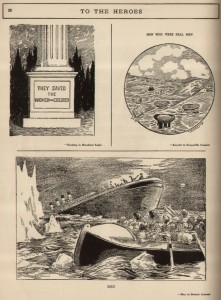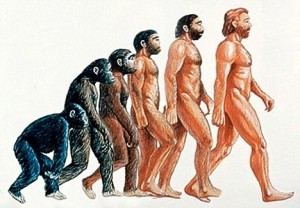 By Scott T. Allison and George R. Goethals
By Scott T. Allison and George R. Goethals
The world recently observed the 100th anniversary of the Titanic disaster in which 1,514 people died after the ship struck an iceberg. Much has been said about the “women and children first” rule that determined who would be the lucky ones to board the limited number of lifeboats. Editorial cartoons of the day honored the heroic men who sacrificed their lives to allow others to live. While gender roles have certainly changed since 1912, studies show that there is still considerable pressure on males to protect women from danger and to place their own well-being behind that of women.
Psychologist Roy Baumeister at Florida State University thinks he knows why men seem so self-sacrificing. In nearly all human societies “men are expendable,” he proclaims. And with expendability comes the kind of heroism shown by the men of the Titanic who drowned so that others would live.
Understanding Baumeister’s argument requires an examination of his larger thesis, namely, that evolution has endowed men and women with different motivations and priorities. In his recent book, Is There Anything Good About Men, Baumeister first examines our patriarchal society — the inescapable fact that men have long dominated the political and economic spheres of our culture. Men are more likely than women to be presidents, prime ministers, and members of Congress and Parliament. Men are also more likely to be CEOs of major corporations and wielders of power on Wall Street.  We also see more men discovering cures for diseases, exploring space, and creating great works of art.
We also see more men discovering cures for diseases, exploring space, and creating great works of art.
Feminists have argued that this gender gap in power, success, and wealth is due to men’s deliberate attempt to oppress women. Baumeister does not disagree with this assertion. He does, however, challenge us to understand culture (e.g., a country, a religion) as an abstract system that competes against rival systems and that uses both men and women, often in different ways, to advance its cause.
Baumeister’s first observation is that while there are no doubt more men than women at the top of society, there are also more men at the bottom. Men are far more likely than women to commit crimes and to serve time in prison. Men are also more likely to suffer from severe mental disabilities; they are more likely to die in wars; they are more likely to be homeless; and they are more likely to have the worst and most dangerous jobs in society.
In short, Baumeister argues that men go to extremes more than women. “In an important sense,” he writes, “men really are better AND worse than women.”
Why is this the case? Baumeister points to biology and evolution. Recent research using DNA analysis reveals that today’s human population is descended from twice as many women as men. Throughout all of human history, it is estimated that perhaps about 80% of women but only 40% of men have been able to reproduce. “It would be shocking,” writes Baumeister, “if these vastly different reproductive odds for men and women failed to produce some personality differences.”
Because men have faced a more daunting challenge in reproducing, they may have evolved to be more risk-taking than women. Nature may have designed men to take chances, try new things, be creative, and explore bold possibilities.  Becoming a hero who succeeded in these risky endeavors may have given men a better chance to attract a woman with whom to reproduce.
Becoming a hero who succeeded in these risky endeavors may have given men a better chance to attract a woman with whom to reproduce.
Baumeister believes that because women are able only to bear a few children in their lifetime, their priority is to “play it safe” and invest time in developing close intimate relationships. Women have done best by minimizing risks.
The key to understanding why women have evolved to avoid physical risk lies in understanding what drives population growth. Baumeister argues that population growth depends much more upon there being plenty of women than upon there being plenty of men. “To maximize reproduction,” says Baumeister, “a culture needs all the wombs it can get, but only a few penises can do the job.” If a society loses half its men, the next generation can still be full-sized. But if it loses half its women, the size of the next generation will be significantly smaller. As a result, most cultures keep their women out of harm’s way while using men to do the risky work.
In short, men were designed by nature to take chances, risk their lives, and strive — mostly unsuccessfully — for greatness.
According to Baumeister, the emergence of gender inequality may have little to do with men pushing women down in a patriarchal conspiracy. Rather, it came from naturally evolving forces that drove expendable men to seek out wealth, knowledge, and power at great risk to themselves and with the goal of improving their reproductive chances.
This brings us back to the Titanic and the men who heroically died so that women and children would live. While nature may have designed men for this type of bold heroic sacrifice, this same brazenness sends many men spiraling downward toward a life of crime and other villainous activities. Men are thus hard-wired for both greatness and wretchedness. It’s a provocative idea, and it’s not without its detractors. But it is also an idea well-worth thinking about.
References
Allison, S. T., & Goethals, G. R. (2011). Heroes: What They Do & Why We Need Them. New York: Oxford University Press.
Baumeister, R. (2010). Is There Anything Good About Men?: How Cultures Flourish by Exploiting Men. New York: Oxford University Press.